Journal of Digital Technologies and Law @lawjournal-digital
Статьи журнала - Journal of Digital Technologies and Law
Все статьи: 248
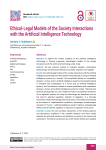
Ethical-Legal Models of the Society Interactions with the Artificial Intelligence Technology
Статья научная
Objective: to explore the modern condition of the artificial intelligence technology in forming prognostic ethical-legal models of the society interactions with the end-to-end technology under study. Methods: the key research method is modeling. Besides, comparative, abstract-logic and historical methods of scientific cognition were applied. Results: four ethical-legal models of the society interactions with the artificial intelligence technology were formulated: the tool (based on using an artificial intelligence system by a human), the xenophobia (based on competition between a human and an artificial intelligence system), the empathy (based on empathy and co-adaptation of a human and an artificial intelligence system), and the tolerance (based on mutual exploitation and cooperation between a human and artificial intelligence systems) models. Historical and technical prerequisites for such models formation are presented. Scenarios of the legislator reaction on using this technology are described, such as the need for selective regulation, rejection of regulation, or a full-scale intervention into the technological economy sector. The models are compared by the criteria of implementation conditions, advantages, disadvantages, character of “human – artificial intelligence system” relations, probable legal effects and the need for regulation or rejection of regulation in the sector. Scientific novelty: the work provides assessment of the existing opinions and approaches, published in the scientific literature and mass media, analyzes the technical solutions and problems occurring in the recent past and present. Theoretical conclusions are confirmed by references to applied situations of public or legal significance. The work uses interdisciplinary approach, combining legal, ethical and technical constituents, which, in the author’s opinion, are criteria for any modern socio-humanitarian researches of the artificial intelligence technologies. Practical significance: the artificial intelligence phenomenon is associated with the fourth industrial revolution; hence, this digital technology must be researched in a multi-aspectual and interdisciplinary way. The approaches elaborated in the article can be used for further technical developments of intellectual systems, improvements of branch legislation (for example, civil and labor), and for forming and modifying ethical codes in the sphere of development, introduction and use of artificial intelligence systems in various situations.
Бесплатно
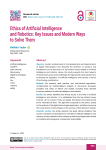
Ethics of Artificial Intelligence and Robotics: Key Issues and Modern Ways to Solve Them
Статья
Objective: modern achievements in the development and dissemination of digital technologies have attracted the attention of scholars and practitioners to the discussion of key ethical issues related to artificial intelligence and robotics. Hence, this study presents the most relevant of these issues, posing new challenges for legal scholars and practitioners to develop the regulation of artificial intelligence and robotics in terms of technology moralization. Methods: the research used practice- and risk-oriented approaches, complemented by multidisciplinary analysis of documents (European principles and codes of ethics) and studies, including those devoted to various problems of artificial intelligence and robotics. Results: the article identifies key ethical issues in the field of artificial intelligence and robotics. It is established that the key ethical issues involved can be solved if they are legally formalized and implemented at the international level. The algorithm proposed by the author, based on the analysis of the digital technologies application, will allow improving the moral actions of technologies in the process of their decision making. Scientific novelty: the article presents the latest ethical problems that concern scientists and practitioners in the field of artificial intelligence and robotics, and the methods of their solution by ethical and legal means aimed at moralizing technology and increasing its responsibility. Practical significance: all solutions presented in the article have practical significance and are ready for wide implementation at the international level. Their formalization in normative form and subsequent compliance will reduce the harm that artificial intelligence may cause in applied fields, including robotics using artificial intelligence. Regulatory, including legislative, decisions must therefore be taken as soon as possible to ensure that artificial intelligence and robotics become reliable tools for these systems to be used at work, at home, and in other areas such as shopping centers, stores, schools, universities, etc.
Бесплатно
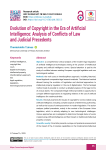
Статья
Objective: a comprehensive critical analysis of the modern legal regulation of artificial intelligence technologies arising at the junction of intellectual property and artificial intelligence norms. Special attention is paid to the study of conflicts between existing European copyright legislation and new technological realities. Methods: the work uses an interdisciplinary approach, including historical, formal-legal and comparative-legal research methods. The historical method allowed tracing the evolution of legislative and doctrinal approaches to intellectual property regulation in the era of digitalization. The formal-legal method made it possible to conduct a detailed analysis of the legal norms of various states. The comparative-legal method provided an opportunity to compare different approaches to regulating relations in the use of artificial intelligence for creative activities. Results: the study examines the issues of copyright for works created using artificial intelligence, including complex aspects of determining authorship, as well as the issues of anthropocentrism in modern legislation. The author analyzes judicial precedents, mainly in the context of the European Union legislation, which is actively adapting to new technological challenges. Various approaches are investigated to determine the legal status of works created using artificial intelligence and their impact on traditional intellectual property concepts. Scientific novelty: the article presents a unique comprehensive assessment of the impact of the AI creative capabilities on the fundamental intellectual property concepts. The scientific significance lies in the author’s original assessment of the impact of artificial intelligence technologies on copyright legislation, based on a detailed analysis of judicial precedents and doctrinal approaches. The author investigate the prospective development of legal regulation in the context of technological progress. Practical significance: the paper proposes legal and governmental solutions aimed at creating a balanced and effective intellectual property regime in the era of artificial intelligence. Recommendations were developed to improve legislation, taking into account existing judicial precedents and the needs of the digital economy. The research results can be used to develop new regulations and improve the existing legal framework of artificial intelligence regulation.
Бесплатно
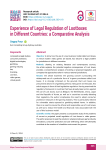
Experience of Legal Regulation of Lootboxes in Different Countries: a Comparative Analysis
Статья
Objective: to show how the use of a new business model called Loot boxes, on which modern video games are based, has become a legal problem for jurisdictions in different countries. Methods: drawing on existing literature and contemporary sources, the article explores the potential negative consequences of Loot boxes, provides a comprehensive analysis of existing or proposed regulation, and compares the approaches taken in various national jurisdictions. Results: the article examines the growing concern surrounding the widespread use of a particular form of in-game purchases called Loot boxes. It is strongly criticized on the grounds that Loot boxes are presumed to be a form of gambling within a video game. On this basis, this article argues in favor of their legislative regulation. Having examined the regulatory framework in countries that have already taken action against the use of Loot boxes, such as Belgium, the Netherlands, China, Japan and the Republic of Korea, as well as in countries currently debating their regulation, the author emphasizes the need to adopt consumer protection measures in the gaming industry. This is particularly relevant for vulnerable strata exposed to gambling-related harms. In addition, there is a need to ensure the ethical and responsible use of Loot boxes, as well as to reduce the health and financial risks associated with the use of this business model. Scientific novelty: the paper presents a comparative study of the problems of current or projected social regulation of Loot boxes in video games. The author proposes to seek the solution in a balance between game industry innovations, consumer protection and user well-being, which will ultimately contribute to the creation of a healthier environment for gamers. Practical significance: the study highlights the international scope of the problem the difference in legal and ethical regulatory measures taken in different countries to address the psychological, social and financial consequences associated with the proliferation of lootboxes in video games. These measures are yet to be assessed, taking into account the findings concerning the gaming industry.
Бесплатно
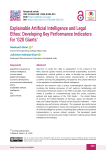
Статья
Objective: to study the “right to explanation” in the context of the PEEC doctrine (public interest, environmental sustainability, economic development, criminal justice) in order to develop key performance indicators reflecting the socio-cultural characteristics of different countries and ensuring adaptability, transparency and cultural relevance in the regulation of explainable artificial intelligence. Methods: the research uses a unique methodological approach that combines the iterative processes of soft systems methodology with a theoretical framework based on the PEEC principles. Such integration makes it possible to comprehensively study the social, economic, political and legal regimes of the ‘G20 Giants’ – the United States of America, the Federal Republic of Germany, Japan, the Republic of India, the Federal Republic of Brazil and the Russian Federation – when designing key performance indicators. The proposed key performance indicators are applicable to assess the transparency and accountability of artificial intelligence systems, simplifying data collection and practical implementation in various cultural contexts. The developed model corresponds to the actual social needs in decision-making using artificial intelligence technologies. Results: the study proposes a new legal model for regulating explainable artificial intelligence based on a system of key performance indicators. In addition to eliminating the problems of regulating explainable artificial intelligence in various cultural, ethical and legal fields, this model ensures that the system of regulating explainable artificial intelligence properly takes into account anthropocentric aspects, since it is focused on unlocking the true potential of artificial intelligence. The proposed approach promotes the most effective use of artificial intelligence technologies for the benefit of society in the perspective of sustainable development. Scientific novelty: the work applies a unique scientific approach that takes into account cultural, ethical, socio-economic and legal differences when developing a legal framework for regulating explainable artificial intelligence. This allows adapting the legal framework to various national conditions, while contributing to responsible management of artificial intelligence with a check-and-balance system. Practical significance: the results obtained make it possible to use the proposed legal model in the practical activities of government agencies and developers of artificial intelligence systems to ensure transparency and explainability of technologies. Effective adjustment of the proposed key performance indicators, taking into account the specifics of states, will optimize them for universal use. Although all five key performance indicators are relevant for the ‘G20 Giants’, their relative significance depends on the socio-cultural and legal conditions of a particular state. Further research should cover a wider range of issues, including other developed and developing countries, in order to adapt the regulation of explainable artificial intelligence to various national and global requirements.
Бесплатно
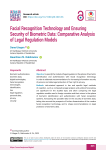
Статья научная
Objective: to specify the models of legal regulation in the sphere of biometric identification and authentication with facial recognition technology in order to elaborate recommendations for increasing information security of persons and state-legal protection of their right to privacy. Methods: risk-oriented approach in law and specific legal methods of cognition, such as comparative-legal analysis and juridical forecasting, are significant for the studied topic and allow comparing the legal regulation models used in foreign countries and their unions in the sphere of biometric identification and authentication with facial recognition systems, forecasting the possible risks for the security of biometric data, taking into account the prospects of further dissemination of the modern facial recognition technology, and to shape recommendations on legal protection of biometric data. Results: the ways are proposed to further improve legislation of the Republic of Kazakhstan and other countries currently developing the legal regulation of biometric data, regarding the admissible criteria for using the facial recognition technology, the elaboration of categorization of biometric systems with a high and low risk levels (by the example of the experience of artificial intelligence regulation in the European Union), and the necessity to introduce a system of prohibitions of mass and unselective surveillance of humans with video surveillance systems, etc. Scientific novelty: consists in identifying a positive advanced foreign experience of developing legal regulation in the sphere of facial recognition based on biometry (European Union, the United States of America, the United Kingdom of Great Britain and Northern Ireland), which can be used for further improvement of the national legislation in order to create more effective mechanisms of legal protection of personal data, including biometric information. Practical significance: based on risk-oriented approach and comparative analysis, the research allows elaborating measures for enhancing the legal protection of biometric data and ensuring effective protection of civil rights and freedoms by forecasting further expansion of the modern facial recognition technology.
Бесплатно
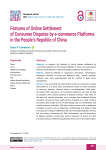
Статья научная
Objective: to research the features of online dispute settlement by e-commerce platforms in the People’s Republic of China, to reveal positive features and drawbacks of ODS technologies applied by the platforms. Methods: empirical methods of comparison, description, interpretation; theoretical methods of formal and dialectical logic. Specific scientific methods were used: legal-dogmatic and the method of legal norms interpretation. Results: it was found that the internal ODS model on e-commerce Taobao ODS platforms is a direct, clear and effective means of online resolution of consumer disputes. However, being a non-independent “third party”, the internal ODS mechanism of e-commerce platforms will never be able to substitute other external systems of dispute resolution. ODS relies on the data and Internet processes much stronger than traditional dispute resolution. Among the many safety factors emerging as a result of online processes, ODS creates the risk of data leakage, lack of confidentiality and unsafe consumer protection. ODS also causes concerns due to traditional principles of justice such as objectivity, confidentiality and safety of data in the process of dispute settlement. Not only the People’s Republic of China but any country introducing the ODS technologies into the procedures of dispute resolution should take serious measures to ensure the ODS processes are just, unbiased and guarantee observance of procedural rights. Scientific novelty: consists in a complex research of online dispute settlement by e-commerce platforms in the People’s Republic of China, the practice of implementation thereof has its specific features stemming from the model of self-regulation of thee relations, further stipulated by normative legal acts of the People’s Republic of China and reflected in the activity of private ODS platforms. Practical significance: is due to the current absence of possibility to apply the legal norms and rules, taking into account the specific features of ODS technologies on private platforms, to the relations using such technologies. The main provisions and conclusions of the research can be used to improve the mechanisms of legal regulation of ODS technologies in the procedural legislation of the Russian Federation.
Бесплатно
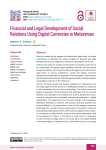
Financial and Legal Development of Social Relations Using Digital Currencies in Metaverses
Статья
Objective: based on the analysis of financial and legal policy of certain jurisdictions, to determine the initial prospects of financial and legal development of social relations in metaverse using digital currencies. Methods: the research is based on the system of cognitive tools: first of all, formal-legal, comparative-legal, statistical methods, and the method of legal forecasting, which help to interpret the legal norms and financial-legal policy of various jurisdictions, assess the degree of current development of legislation on regulation of technologies in virtual worlds, and formulate ideas about the financial-legal regulation of public relations using digital currencies in the metaverse. Results: the study reveals that modern legislation on metaverses is at the initial stage of its formation, as in developed jurisdictions metaverse is still considered only as a future technology. The author shows the degree of popularity of the metaverse first prototypes and the growing attention of some states to the metaverse in order to develop their socio-economic potential and consolidate international leadership in digital development. The paper points out the shortcomings of the metaverse definitions developed in doctrine and practice, and long proposes the author’s definition. It is argued that in order to fully integrate metaverse technology into a certain country, whose policy is focused on achieving (maintaining) a high rating in terms of the economy digital transformation, it is necessary to determine the currency that will be legitimately used in the metaverse in future. A conclusion is made that it is necessary to plan financial and legal policy in this area, which will largely depend on the legal regime of cryptocurrency in a particular country. It is argued that further development of the metaverse concept in Russia will depend on the results of testing the digital ruble. Scientific novelty: the paper is one of the first devoted to the convergence of metaverse and financial law, which proposes a concept for establishing full-fledged legality of digital currency in the metaverse depending on the attitude of a particular country to decentralized finance. Along with popular definitions formulated in doctrine and practice, the author presents their own interpretation of the metaverse, indicating its essential features. Practical significance: the conclusions and proposals obtained can be used to improve the mechanisms of financial and legal regulation of social relations under the emerging metaverse concept. The presented ideas are important for further research of various financial and legal aspects of metaverses’ development and functioning.
Бесплатно
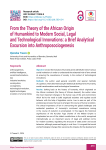
Статья
Objective: to trace the evolution of humanity and to identify the role of various social institutions in order to understand the existential role of laws aimed at ensuring the coexistence of society in the context of technological innovations. Methods: the author used general scientific and special methods of cognition, which allowed tracing the dialectical development of humanity, social transformations and technological innovations. Results: looking back at the history of humanity, which originated on the African continent (the theory of African descent), the author notes the most important changes in the human way of life and environment, which led to the need to build organized societies and regulate social behavior with the help of legislative norms. Law is seen as part of the evolutionary process that was to emerge in the course of human evolution. The critical importance of law in overcoming the global challenges and existential questions of humanity’s continued coexistence arising in the course of evolution is emphasized. In this regard, the historical significance of the Kurukan Fuga Charter of the Malian Empire is emphasized as one of the oldest constitutions in the world, recognized internationally as an important source of legal and political norms for modern societies, regulating the structure of state power and social behaviour, although preserved largely in oral form. It is argued that social and technological change often served as the impetus for the development of new laws. Humanity has many times intervened in its own biological evolution with the help of technology; now it is an important moment from the viewpoint of law and ethics when technology may interfere in further human evolution. The greatest concern in this regard is the era of rapid development of artificial intelligence, which makes new demands on a human being. Scientific novelty: the article shows the role of the African continent in the origin and development of humanity and socio-legal institutions in the light of modern transformations and the construction of a new social reality. Practical significance: the conducted research creates prerequisites for further development of the theory of anthroposociogenesis and in-depth conceptual historical and legal study of the role of the African continent in the development of humanity and its social institutions.
Бесплатно
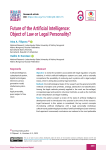
Future of the Artificial Intelligence: Object of Law or Legal Personality?
Статья научная
Objective: to reveal the problems associated with legal regulation of public relations, in which artificial intelligence systems are used, and to rationally comprehend the possibility of endowing such systems with a legal subject status, which is being discussed by legal scientists. Methods: the methodological basis of the research are the general scientific methods of analysis and synthesis, analogy, abstraction and classification. Among the legal methods primarily applied in the work are formal-legal, comparative-legal and systemic-structural methods, as well as the methods of law interpretation and legal modeling. Results: the authors present a review of the state of artificial intelligence development and its introduction into practice by the time of the research. Legal framework in this sphere is considered; the key current concepts of endowing artificial intelligence with a legal personality (individual, collective and gradient legal personality of artificial intelligence) are reviewed. Each approach is assessed; conclusions are made as to the most preferable amendments in the current legislation, which ceases to correspond to the reality. The growing inconsistency is due to the accelerated development of artificial intelligence and its spreading in various sectors of economy, social sphere, and in the nearest future – in public management. All this testifies to the increased risk of a break between legal matter and the changing social reality. Scientific novelty: scientific approaches are classified which endow artificial intelligence with a legal personality. Within each approach, the key moments are identified, the use of which will allow in the future creating legal constructs based on combinations, avoiding extremes and observing the balance between the interests of all parties. The optimal variant to define the legal status of artificial intelligence might be to include intellectual systems into a list of civil rights objects, but differentiating the legal regulation of artificial intelligence as an object of law and an “electronic agent” as a quasi subject of law. The demarcation line should be drawn depending on the functional differences between intellectual systems, while not only a robot but also a virtual intellectual system can be considered an “electronic agent”. Practical significance: the research materials can be used when preparing proposals for making amendments and additions to the current legislation, as well as when elaborating academic course and writing tutorials on the topics related to regulation of using artificial intelligence.
Бесплатно
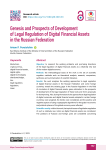
Статья научная
Objective: to research the existing problems and promising directions of the legal regulation of digital financial assets as a relatively new tool of the modern digital economy. Methods: the methodological basis of the work is the set of scientific cognition methods such as theoretical analysis, research, comparison, synthesis, and summarization of scientific literature. Results: the work analyzes the existing approaches to legal regulation of digital financial assets in the Russian Federation and some foreign countries, reveals the existing gaps in the Russian legislation in the field of circulation of digital financial assets, gives estimation to the prospects of development of the legal regulation of these tools and forms proposals for its improving. Also, during the research, the approaches to legal regulation of digital currencies and digital financial assets, adopted in certain foreign countries, were analyzed, the trends were considered, and the positive and negative aspects of using cryptographic algorithms for the goals in economic and juridical spheres of the global economy were reflected. Scientific novelty: within the work, the topical issues of legislative regulation of such a relatively new notion as digital financial assets are considered. The positions of Russian and foreign jurist are considered concerning the existing problems and risks associated with “tokenization” and “blockachainization” of private law. Besides, the author comes to a conclusion about the existence of significant gaps in the current approach to legal regulation of digital financial assets, indicates them and proposes certain mechanisms to solve these problems. Practical significance: is due to the imperfect current legislation in the sphere of relations occurring when using the technologies based of distributed ledger, including digital financial assets. Research of these problems allows evaluating the risks, considering the existing ways of overcoming and solving the emerging disputable questions. Also, the conclusions obtained can be used to improve the Russian legislation, as well as in the academic literature devoted to the topical issues of developing the digital legislation.
Бесплатно
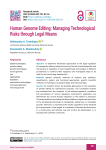
Human Genome Editing: Managing Technological Risks through Legal Means
Статья научная
Objective: to determine theoretical approaches to the legal regulation of reprogenetic editing, taking into account the risk-oriented approach and the practice of regulation of such breakthrough technologies in different jurisdictions; to outline further regulatory and managerial steps to be taken for the technology development. Methods: general scientific methods of analysis and synthesis, classification, system and functional approaches; specific scientific methods: formal-legal, comparative-legal, and historical-legal. Results: the research shows the possible approaches to the regulation of genetic editing for reproductive purposes. The considered variants are evaluated from the viewpoint of risk-oriented approach; conditions and peculiarities of various regulatory mechanisms’ application are determined; the current Russian regulation in this sphere is assessed. The analysis allows concluding that the prohibition or significant restriction of the developing technology of reprogenetic editing has no irrefutable grounds. Moreover, it may lead to the results opposite to those declared by its proponents. In this regard, it is necessary to develop the discussion in a constructive and iterative way and involve all stakeholders in it, including the scientific community. Scientific novelty: the international practice of legal regulation of reprogenetic technologies within different jurisdictions was generalized and conceptually interpreted; the natural scientific arguments in assessing the implemented regulation effectiveness were analyzed. This not only allows systematically considering the current and hypothetical risks of genetic technologies’ development and use, but also provides an opportunity to use a risk-oriented approach to the analysis of legal regulation of genome editing technologies. The next step in comprehending the phenomenon of genetic editing becomes possible. Practical significance: the study results can be used for building further constructive dialog on applying legal mechanisms to human genome editing. The study can also be a basis for iterative approach in the future discussion.
Бесплатно
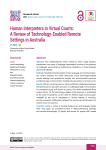
Human Interpreters in Virtual Courts: A Review of Technology-Enabled Remote Settings in Australia
Статья научная
Objective: This interdisciplinary review intends to inform legal scholars, practitioners, and users of language interpretation services in the judiciary of challenges encountered by professional interpreters in virtual hearings and remote settings. Methods: Situated at the intersection of law, language, and communication, this review analyses the latest discourses about technology-enabled remote settings and synthesises insights into recommended practices in effective legal communication mediated by interpreters in virtual courts. Results: With an overarching aim to improve effective collaboration between interpreting service providers and users in multilingual legal communication for procedural equity and access to justice, this review establishes three central claims: (1) the technology-enabled virtual hearings is accelerated by the covid-19 pandemic, (2) the need for effective legal communication mediated by the use of interpreters in remote settings is mounting, and (3) successful collaboration between the service user and provider can achieve a win-win outcome. Scientific novelty: A review of existing studies in law and language reveals three main gaps: (1) procedural justice in videoconferencing hearings and remote technologies, (2) equity and access for people with limited proficiency in the official language of the court system, and (3) effective legal communication mediated by human interpreters in virtual courts. This review bridges the existing gaps in knowledge. Practical significance: it touches on three aspects of the law-language nexus: (1) Covid-19 accelerated adoption of the virtual courtroom technologies in Australia and its impact on court interpreting, (2) challenges for interpreters in remote settings, and (3) achieving linguistic accuracy and intercultural appropriateness when preserving the manner in which the content is expressed as intended or implied by the original speaker. Grounded in courtroom interpreting practices, it highlights the importance of effective collaboration in successful multilingual legal communication rooted in mutual purpose, shared expectations, and interprofessional understanding.
Бесплатно
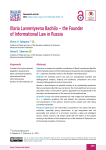
Illaria Lavrentyevna Bachilo – the Founder of Informational Law in Russia
Статья научная
Objective: to assess the scientific contribution of Illaria Lavrentyevna Bachilo into forming the science of informational law in Russia; the role and significance of I. L. Bachilo’s scientific works for the Russian informational law. Methods: the methods used in the work are: retrospective scientific and bibliographical analysis, analysis and synthesis, comparison and cross checking, bibliographical study of documents. Results: a brief analysis of scientific activity of an outstanding researcher Illaria Lavrentyevna Bachilo was carried out; the most significant works were described, which, in the authors’ opinion, appeared to be fundamental in the formation and development of the science of informational law. Scientific novelty: the article presents the main stages and achievements of I. L. Bachilo’s academic life and reflects the personal estimations and impressions of the authors, formed during mutual work with Illaria Lavrentyevna Bachilo. Practical significance: the information presented in the article will allow scientists, especially young researchers, to get acquainted with the personality and activity of a prominent scientist, a deep and intelligent person, whose memory will always dwell with the hearts of the people working in the Section of Informational Law of the Institute of State and Law of the Russian Academy of Sciences.
Бесплатно
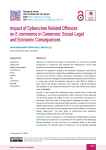
Статья
Objective: to examine the impact of cybercrimes on e-commerce related transactions in Cameroon and evaluate the effectiveness of the legal provisions in force that counteract cyberthreats. Methods: The research is based on the utilitarian, transaction cost and the rational choice theories. It adopts the qualitative research methodology with the use of the doctrinal method. The author conducted a comprehensive analysis of Cameroon’s legal acts in the field of cybersecurity and e-commerce. A survey was carried out between January to April 2025 at Molyko in Buea where 250 sample responses were obtained. Judicial precedents and statistics of the Cameroon Ministry of Posts and Telecommunications were investigated. Results: It was found that cybercrimes have caused loss of trust and confidence in e-commerce transactions within Cameroon and a declining rate at which people are willing to carry out e-commerce transactions in Cameroon. More than 60% of young persons between the ages of 16 to 35 years in some major Cameroonian cities are either involved in e-commerce related cybercrimes or suffered from them. It was also observed that there is an increase in the rate at which female persons are involved in e-commerce related cybercrimes. The main types of cybercrimes were identified: scamming, phishing, and bank card skimming. Scientific novelty: it consists in a comprehensive interdisciplinary analysis of the impact of cybercrime on e-commerce in the context of the developing African economy. For the first time, an empirical study of the scale of cybercrime in a specific region of Cameroon was conducted, including a quantitative assessment of youth involvement in illegal activities. The author has developed a theoretical model that combines the utilitarianism, transaction costs, and rational choice concepts to explain the motivation of cybercriminals. Specific socio-legal factors contributing to the growth of cybercrime in the context of the socio-political crisis were identified. Practical significance: The study results are of great practical significance for improving the legal, technological, social and economic mechanisms for countering cybercrime in Cameroon. The proposed recommendations include reforming procedural legislation, expanding the powers of specialized agencies, introducing a system of home addresses and social security numbers, raising the minimum wage, and integrating courses on cybersecurity into educational programs. The data obtained can be used by government agencies, the judicial system, educational institutions and international organizations to develop effective strategies to combat cybercrime and develop a secure digital economy.
Бесплатно
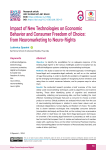
Статья
Objective: to identify the possibilities for an adequate response of the existing legal regime to the various challenges posed to European law by artificial intelligence systems underlying neuromarketing techniques. Methods: the study is based on the risk-oriented approach, formal-logical, formal-legal and comparative-legal methods, as well as on the method of legal forecasting, in order to identify the problems of legislation caused by the emerging technologies capable of recognizing human emotions and using them to control consumer behavior, and to propose ways to solve them. Results: the conducted research provides a brief overview of the most widely used neuromarketing techniques used by algorithms and machine learning. These allow identifying points of cognitive and emotional vulnerability, collecting and processing data, and then building the most effective marketing techniques that push a consumer to choose a certain product or service. Ethical problems are analyzed which arise from the use of neuromarketing techniques in relation to some basic values such as individual independence, human dignity, and freedom of choice. The subtle line is shown between techniques that manipulate consumer behavior (manipulation technique) and those that, on the contrary, have a persuasive effect, which in itself does not make them illegal (persuasion technique). An overview of the existing legal framework is presented, as well as case law from both the European Court of Justice and national courts of member states with a particular focus on the Unfair Commercial Practices Directive, the EU General Regulation on the Protection of Personal Data (hard law), and codes of ethics (soft law). Scientific novelty: the paper points out the transformation of traditional legal categories and important problem points of the existing regulation due to the growing recognition of the potential of neuromarketing as a tool capable of explaining and predicting consumer behavior, as well as influencing the economic behavior of the subjects of relations. Practical significance: the obtained conclusions and proposals can be taken into account in improving the regulation of artificial intelligence in terms of its safety and reliability, increasing trust in the system, given the need to protect ethical principles and maintain fundamental values.
Бесплатно
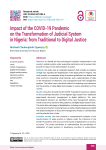
Статья
Objective: to identify the key technological solutions implemented in the country’s judicial system under quarantine restrictions and to assess their long-term impact on the administration of justice. Methods: the study uses an integrated approach that includes an analysis of legal acts regulating the digitalization of the legal sphere in Nigeria. The work provides a comparative study of practical guidelines from federal and state courts for conducting virtual hearings, and a systematization of data on the introduction of electronic case management and trial management systems. The author uses a doctrinal method of analyzing court decisions and the practice of using digital technologies in various jurisdictions of the country. Results: the author showed that the COVID-19 pandemic became a catalyst for the accelerated transition of the Nigerian legal system from traditional paper-based document management to digital platforms. The main technological solutions are identified: online case management systems, virtual courtrooms, electronic filing systems, and digital legal research tools. The article lists advantages of digitalization, including increased productivity, ensuring security when reviewing cases, as well as disadvantages associated with depersonalization of document management, threats to confidentiality and the potential loss of jobs. Scientific novelty: the work presents a comprehensive analysis of the transformation of legal practice in Nigeria under the influence of the COVID-19 pandemic with a focus on the impact of digitalization on access to justice. The study contributes to understanding the peculiarities of adaptation of legal systems in developing countries to extraordinary circumstances through the prism of technological innovations. The author developed the concept of the relationship between the judicial system’s digital transformation and ensuring the constitutional right to a fair trial under the social distancing. Practical significance: the study results can be used to improve the legal framework for the legal sphere digitalization in Nigeria and other developing countries. The conclusions are important for shaping policy in the field of modernizing judicial systems, developing ethical standards for virtual legal proceedings and creating effective mechanisms for ensuring access to justice in the digital age. Practical recommendations can be applied by judicial authorities to optimize the processes of administration of justice and to improve the quality of legal services.
Бесплатно
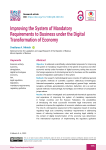
Статья научная
Objective: to elaborate scientifically substantiated proposals for improving the system of mandatory requirements in the sphere of business and other economic activity under formation of digital economy, taking into account the foreign experience of eliminating barriers for business and the available practice of legislation optimization in this sphere. Methods: the research methodological basis consists of traditional general and specific methods of scientific cognition: dialectical, formal-logical, historical-comparative, systematic, terminological, general logic methods (analysis, synthesis, generalization, induction, deduction, etc.), as well as special methods: historical-legal, formal-legal, and method of comparative jurisprudence. Results: the author investigated and systematized theoretical approaches and experience of improving the system of mandatory requirements in foreign countries and the Russian Federation; the possibilities of introducing the most successful innovative legal instruments and practices to improve the regulation of economic relations were considered. The role of a retrospective assessment of the regulatory impact of existing regulatory legal acts containing mandatory requirements in addressing issues of reducing burdensome rules and ensuring legal stability in the context of digital transformation of the economy was determined. The international experience of implementing the regulatory guillotine mechanism was considered; its essence, purpose, tasks, basic principles, and algorithm of operation were revealed. The issues of establishing and evaluating the application of the requirements for business contained in regulatory legal acts were analyzed. Scientific novelty: the author’s comprehensive analysis of existing scientific developments on improving the system of mandatory requirements for business; systematization of scientific and theoretical approaches to the selection of innovative legal instruments to eliminate excessive legal regulation of economic relations; generalization of successful foreign practices in the implementation of “regulatory guillotine” measures. Practical significance: recommendations were developed for effective reduction of burdensome requirements that negatively affect the development of business in the context of digital transformation of the economy. Conditions were determined for the implementation of a full-fledged regulatory impact assessment procedure and the successful implementation of regulatory reforms. The results of the study can be used in standard-setting activities and in the educational process when elaborating educational programs in Economics and Law.
Бесплатно
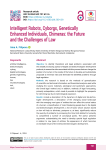
Статья
Objective: to identify theoretical and legal problems associated with the steadily increasing spread of digital and biotechnologies’ development products; to assess the risks associated with this process that can change the position of a human in the society of the future; to develop and substantiate proposals to minimize risks and eliminate the identified problems through legal regulation. Methods: the research is based on the methods of generalization of scientific and technical information and theoretical analysis used while studying the source materials; axiological and systematic approaches; the formal legal method and, in addition, methods of legal forecasting, primarily extrapolation, which made it possible to highlight the prospects for reforming law due to technological expansion. Results: include a description of the dynamics of digital and bio-technologies’ development; a description of the changing social landscape with the emerging new types of entities that can affect the actual status of a human; a classification of risks threatening people due to the digital and biotechnologies development; a list of tasks whose solution based on law will help to eliminate, postpone or, at least, significantly reduce the severity of problems by increasing the time limit allotted to humanity to comprehend a number of conceptual points. The author presents arguments substantiating the need to develop special legal regulation in relation to new types of entities, the appearance of which becomes an inevitable result of the mentioned technologies’ development. Scientific novelty: consists, first, in a comprehensive study of the development of interconnected groups of digital and biotechnologies, taking into account their increasing convergence; and, second, in the formulation of legal problems that need to be resolved due to the potential emergence of new types of entities with cognitive functions and capable of having a targeted intellectual impact on the environment and legal entities. Practical significance: it is present in the answers given to the formulated legal questions, which contain suggestions and recommendations on the necessary adjustment of legal regulation and focus the attention of legal scholars on the problems arising from the pace and vectors of science-consuming technologies’ development.
Бесплатно
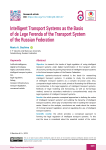
Статья научная
Objective: to research the trends of legal regulation of using intelligent transport systems under digital transformation of the transport sector of economy, namely, the growing importance of intelligent transport systems in the future transport system of the Russian Federation. Methods: systemic-structural method is the basis for researching intelligent transport systems. It enables to study the architecture of intelligent transport systems as a complex structural unity. Also, comparative-legal method was used, aimed at illustrating the differences and similarities in the legal regulation of intelligent transport systems. Methods of legal modeling and forecasting, as well as formal-logic method, served as secondary methods to comprehensively study the legal regulation of intelligent transport systems. Results: the article presents conceptual approaches to defining the notion of “intelligent transport systems” and outlining the hierarchy of intelligent transport systems, which play a fundamental role in building the transport sector. Based on the analysis, conclusions are made about the vectors of forming transport legislation, aimed at regulating the use of intelligent transport systems. Scientific novelty: the article provides a conceptual approach to forming the legal regulation of intelligent transport systems. To this end, the issue is considered about the essential content of the notion of “intelligent transport systems” at legal and scientific levels; the current terminological problems in building the legal regulation are shown. Analysis of the architecture of intelligent transport systems allowed for the first time to formulate the basic approaches to shaping the legal regulation of its individual elements (including highly automated and fully automated transport means, “smart” infrastructure, etc.) not in isolation but as constituent parts of the whole matter. Practical significance: the presented materials and conclusions facilitate the development of legal regulation of transport industry under digital transformation. The article accentuates the legal regulation of intelligent transport systems taking into account their technical and technological features. It is the intelligent transport systems that are de lege ferenda of the transport system, which determines the vector of transformation of transport legislation. In turn, development of the legal bases allows broadening the geography of introducing technical novelties and making their application much more large-scale.
Бесплатно

